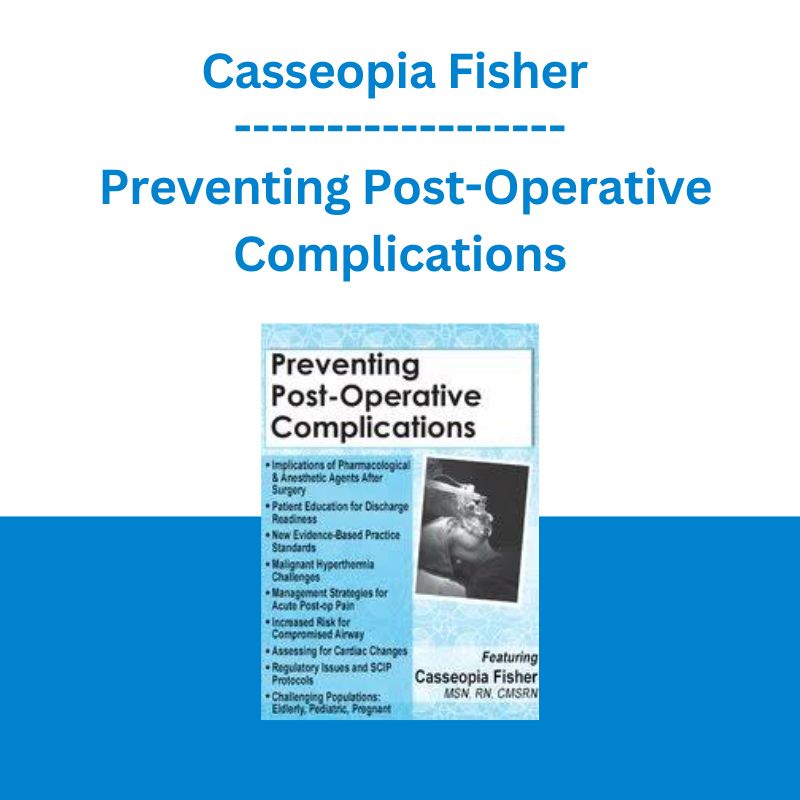*** Proof of Product ***

Exploring the Essential Features of “Casseopia Fisher – Preventing Post-Operative Complications”
Description
Changes in the post-surgical environment mean that patients have shorter post-operative hospital stays and spend more recovery time at home. Nurses providing care in the post-operative setting are left with the highest risk patients and tight schedules for getting them out the door. You are now challenged to ensure safety, minimize complications, and support an optimal recovery along the way.
Speaker
Casseopia Fisher, MSN, RN, CMSRN
Casseopia Fisher, MSN, RN, CMSRN, has practiced nursing in multiple hospital post-surgical environments, including Trauma, Orthopedics, and Surgical Specialties. She is currently Nurse Manager of a Med-Surg unit and ICU, and a graduate of Oregon Health and Science University and Western Governors University.
Casseopia has a passion to share her expertise with healthcare audiences through a variety of presentations that draw from her background. As such, she is a sought-after national presenter on topics that draw from her areas of expertise. She holds her certification in Medical-Surgical Nursing and has a special interest in the management of alcohol withdrawal/drug abuse in the inpatient population.
Speaker Disclosures:
Financial: Casseopia Fisher has employment relationships with Providence Seaside Hospital and Columbia Memorial Hospital. She receives a speaking honorarium from PESI, Inc. She has no relevant financial relationships with ineligible organizations.
Non-financial: Casseopia Fisher is a member of the American Association of Critical Care Nurses and the Medical Surgical Nursing Certification Board.
Outline
Types of Anesthesia and Sedation
- General and regional anesthesia
- Common complications
- Newest research in symptom management
Post-Operative Pain Control
- Complex pain management issues
- Evidence-based pain management
- Ideal vs. real world issues
- Managing effects and side effects
- Over-medication & accommodation
Physiologic Response to Surgical Stress
- Cellular level response
- Stress, inflammatory, and metabolic response
- Understanding the “ebb” and “flow” theory
- Newest research to reduce complications from surgical stress
Sepsis
- Identification and first response
- Real world scenarios and presentations
- The most up-to-date evidence to reduce infection rates
Special Situations & Ethical Issues
- Bloodless surgery
- Special considerations in GI surgery
- Consent issues
- Surgery on the DNR patient
- The ethics of evidence based surgical options
Recovery at Home
- The hospital stay as the first stage of recovery
- Newest patient education theories
- “What I wish someone had told me…”
Objectives
- Explain the essential measures to prevent complications of anesthesia.
- Understand various pain management strategies in the perioperative and postoperative period.
- Evaluate how the human body responds to stress and injury, particularly following a surgical procedure.
- Apply the “ebb” and “flow” theories surrounding responses to trauma.
- Incorporate new skills to prevent complications of surgical intervention.
- Learn how to contribute to an early identification of SIRS, sepsis, severe sepsis and septic shock.
- Propose the immediate interventions that must be taken with sepsis.
- Choose strategies to optimally prepare the patient for recovery at home.
- Incorporate the newest patient education theories in to everyday interactions with patients.
Target Audience
- Nurses
- Nurse Practitioners
- Clinical Nurse Specialists
- Surgery Technicians
- Surgical First Assistants
Reviews
Christy S
“This was such a great course!”
patricia b
“the course was very pertinent to my area of practice.”
Please see the full list of alternative group-buy courses available here: https://lunacourse.com/shop/










 George Fontanills & Tom Gentile - Optionetics Wealth Without Worry Course
George Fontanills & Tom Gentile - Optionetics Wealth Without Worry Course